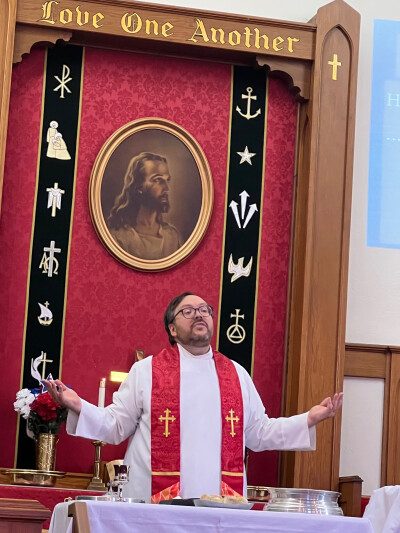Cresaptown UMC grows new spirit of connection in community garden
 When the congregation of Cresaptown UMC began their community garden a few years ago, they had no idea about some of the benefits they would harvest.
When the congregation of Cresaptown UMC began their community garden a few years ago, they had no idea about some of the benefits they would harvest.
Spiritual insights and comfort, increased fellowship and growing outreach, and new partnerships with the surrounding community are just of some of the fruit that has grown out of this ministry
The garden began small in 2020, during the COVID pandemic, when a small group, led by the pastor, the Rev. Patrick Hurder Buhrman, met to ask some formative questions about potential ministries.
The answers led them to start with five raised beds behind the church; last year, they added two 40-foot-long beds and then fencing and gates. In addition, they’ve planted flower gardens in the church’s front yard.
The harvest is shared – with the hungry, with the curious, and with the church. It’s given freely to all as an offering and a reminder of God’s goodness.
However, working with and talking about food has also awakened church members to some of the realities of food insecurity in their community. This summer, the church provided lunches to more than 35 children.
They also partnered with Scouts, community groups and businesses to sponsor four quarterly dinners that bring out more than 200 people to the church for fellowship and a meal.
In the flower beds, church members observe All Saints Day by planting bulbs in memory of loved ones. In the Spring, around the Easter season, those bulbs bloom – “a unique and meaningful act of memory illustrating resurrection,” Hurder Buhrman said.
In addition, the flower garden offers a new front-facing appearance and impression of the church, said Brenda Hansel, a church member. “Many people, including people that I work with, comment on how beautiful it is to see flowers instead of what it was,” she said.
Cresaptown UMC, on the outskirts of Cumberland, is the oldest Methodist Church in the region. Begun in 1784, 240 years ago, its first members used to shoo sheep out of the log building to hold worship and corral them back in after the benediction.
Today, about 75-100 people worship at the two services and online.
The garden has brought people from the community onto the church property to talk and share stories. It has also connected the church with charitable and service groups in the area. Making these connections has brought an increased sense of vitality to the congregation.
“We think about what if would look like if the church was not present, what would be different? This is a formative question,” Hurder Buhrman said.
He finds himself thinking about this vitality in terms of the words “pulse,” or “voice.” People are speaking and acting out of their faith as they create networks in the community,” Hurder Buhrman said.
The church opens its doors wide to the community and groups like Scouts, dance, cheerleading and exercise groups and others use the facility.
Being a presence, church members are also learning more about the problems and challenges their neighbors are facing and are coming up with ways to help address them.
Recently, for example, through the feeding outreach, church members learned about huge and dangerous potholes in a trailer park, which no one is addressing. Church members are beginning to help find a solution.
“We are a lot more present,” Hurder Buhrman said. “We’re learning along the way. But we're also learning it’s okay to do new things and even make mistakes.”
Being present, he said, helps to create a spirit of curiosity and a church culture of learning.
“God is always teaching me something new. In these new experiences, I am learning more about who I am as a child of God.,” he said. “As a church, we’re always learning as we seek to live in-line and in relationship with God,” said Hurder Buhrman.
Hansel believes that “organized religion is not part of people’s lives like it was when I was growing up. COVID did not help it either,” she said. She is hopeful that the garden and Hurder Buhruman’s approach to ministry will make a difference. “It could make people realize that hateful language and actions are not a way to go. Unfortunately, most people realize this too late in their lives.”
This willingness to try and take chances in the name of ministry is creating a culture of hope, say church members. Rather than dwelling on the past, or what might feel impossible, members are willing to try new things and seek transformative changes.
They realize this might be messy, but they’re looking past the surface and polished things and seeing the church as a hospital, not a museum, Hurder Buhrman said. “It’s the conversation of an action faith -- with voice and action together."
And, by growing their garden and setting a table for the whole community, they are discovering and “seeing the beauty of God.”

Great story, Rev. Patrick! It's amazing what connections a tiny little seed can spark! And wonderful to be reminded. (I especially like the line about taking chances.)
You have accomplished so much! As we go by there, we can see the beauty which has been created. You always did enjoy gardening. so I'm so glad that you have found such a beneficial way to use your gardening skills. So proud of what you're doing. Glad that we could be a part of your ministry. May God continue to bless you and Marjorie richly.